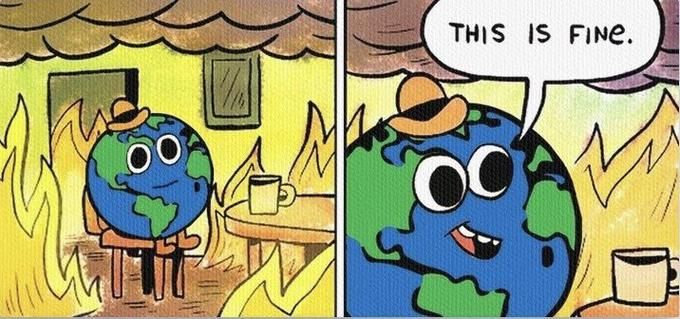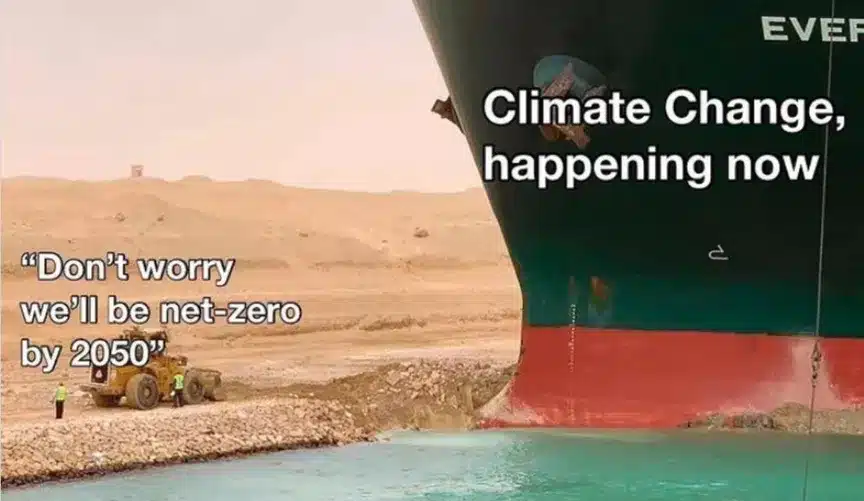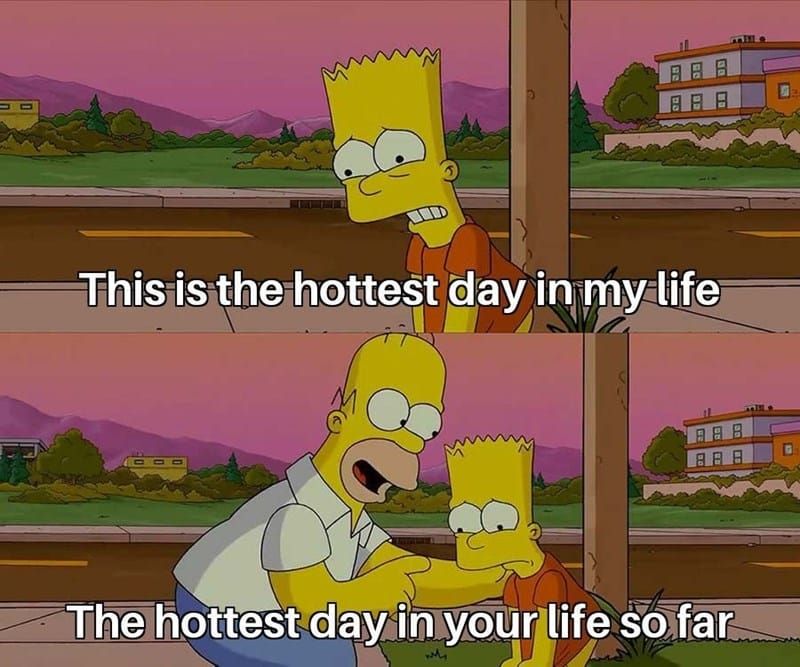What a gas! How serious climate action can be funny, too
By Aaron Sachs | April 1, 2023
 Variation on a meme.
Variation on a meme.
Now that the Biden administration has announced the official end date for the Covid-19 Public Health Emergency in May, we can get back to panicking about climate change. At least it’s a familiar anxiety. We all know the cast of characters: cynical Republicans, hand-wringing Democrats, greenwashing oil executives, grim Gen Z activists. There will be images of fires and floods and refugee camps; there will be Pronouncements of Doom and Counter-Pronouncements about the game-changing promise of electric vehicle charging stations. Carbon emissions will stay steady.
Remember that poignant moment in the 2021 film Don’t Look Up, just before the final tidal wave (spoiler alert), when the lead character says, “We really did have everything, didn’t we?” Well, everything except the political will to reduce carbon emissions.
So: can we please try out a new climate discourse? I ask this as a long-time environmentalist who is badly in need of a morale boost. In honor of April Fool’s Day, how about considering the bolstering effect of a little dark comedy?
When I attend a political gathering, I want to feel energized and inspired, but climate marches are often pretty weighty. Only at a climate march does a participant risk being judged for having arrived via a fossil-fuel-powered death machine. Personally, I prefer the rainbows and giant puppets at gay-rights marches. Couldn’t we swap out our sanctimonious indignation for some campy indignation?

Saving the planet can be fun—and funny. At one otherwise dreary climate rally, I saw a young activist holding a sign that said, “I was hoping for a cooler death!” Or consider the little kid in a climate video who stares at the camera and says, “I can’t drive or vote, but it’s up to me to save the f-ing planet?” Or the guy in a polar bear costume asking, “Where’s my white privilege?”
A lot of us are desperate for some humor, because climate change is flat-out overwhelming. Most well-intentioned people can hear only a certain number of terrifying statistics before wanting to stick their head in a snowbank. But talking about tragedies with a comic flourish can sometimes produce a new kind of community and catharsis.
There’s a long tradition of using gallows humor to gain some purchase on impossible situations. Just ask any Jew, or African American, or Irish person, or queer person (and the list goes on). People even told jokes in concentration camps during World War II. A group of friends in Treblinka used to say to each other, “Hey, don’t eat so much, we’re the ones who are going to have to carry away your body when you die!” Dark comedy is a battle-tested survival strategy.

Maybe we could take a cue from Denver’s beloved underground satirist, Nuclia Waste, the “triple-nipple drag queen of comedy.” I think of her as the perfect spokesperson to help us accept the transnatural reality of Global Weirding. Nuclia, with her glittery beard and green hair and neon party accessories, testifies to the fact that the energy economy will never be entirely clean. Don’t be like Nuclia’s nemesis, the purity-fetishizing Miss Dee Contamination, who always looks perfect in her “EPA-approved prom gown.” Life is messier than that. Wind turbines are going to kill some birds. Climate activism requires a flexible, open-minded, fabulously accessorized persistence.
Laughing at the horror doesn’t mean giving up or failing to take the problem seriously. On the contrary, the idea is to improve everyone’s mood for a minute so that we can re-join the struggle with a bit more determination. “Now that it’s totally futile,” Stephen Colbert once said, “let’s stop arguing about divisive issues like carbon taxes…. Instead, we must come together and do what Americans have always done: we must burn hydrocarbons for pleasure.” But of course his point was that it’s not totally futile—that all we need to do is find common ground. As long as it’s high enough to avoid the rising floodwaters.

Most people feel a measure of relief and acknowledgment when they hear Pronouncements of Doom delivered as punch lines. Dark comedy has always been about reminding ourselves that we’re all in this together—that we all pay taxes and then die (except Donald Trump, who refuses to do either). Almost everyone on the planet spent several months in a Covid lockdown for the sake of society’s most vulnerable people. But the fossil fuel industry can’t handle a little carbon tax for the sake of a stable atmosphere?
Climate change is here, and we all contributed to it. Let’s stop pontificating and start organizing a stealth operation to install solar panels at coal-fired power plants. Let’s stop blowing hot air and start making the world cool again.
Together, we make the world safer.
The Bulletin elevates expert voices above the noise. But as an independent nonprofit organization, our operations depend on the support of readers like you. Help us continue to deliver quality journalism that holds leaders accountable. Your support of our work at any level is important. In return, we promise our coverage will be understandable, influential, vigilant, solution-oriented, and fair-minded. Together we can make a difference.
Keywords: climate action, climate communication, climate communication climate fatigue, climate crisis
Topics: Climate Change, Opinion
















Like the humor. However, feeling down in general about the fate of humanity.
I once floated the idea of a Comedy-jam type fundraiser that explored “the lighter side of nuclear waste,” but few saw the humor in it. The whole point of comedy, in my opinion, is to shine a light on the forbidden, the profane, the depressing, the taboo. Comedy allows us to contemplate the horror of these things without being paralyzed by fear, and there is a lot of fear (and absurdity) surrounding nuclear energy, waste, and weapons. It is the role of a comedian to tread where no one else dares.
WRT birds killed by wind vanes, how many birds have been killed by oil spills? What about oil spill damage to fish, shrimp, destruction of salt marshes and other shorelines, loss of economic activity to seaside communities? There’s no comparison. Besides, wind vanes are constantly being improved to reduce bird/bat kills.